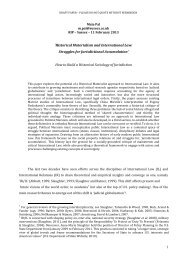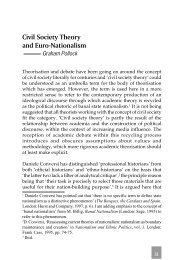Hannah Arendt's Concept of Responsibility - University of Sussex
Hannah Arendt's Concept of Responsibility - University of Sussex
Hannah Arendt's Concept of Responsibility - University of Sussex
You also want an ePaper? Increase the reach of your titles
YUMPU automatically turns print PDFs into web optimized ePapers that Google loves.
Herzog: <strong>Hannah</strong> Arendt<br />
This subjectivisation <strong>of</strong> responsibility is the opposite <strong>of</strong> solipsism. For<br />
Arendt, solipsism is related to egoism and is seen as an apolitical position<br />
(Curtis, 1999: 147). She stresses that the refugees’ answer to their enemy’s<br />
denial <strong>of</strong> their political presence was ‘selfishness,’ that is, the acceptance <strong>of</strong><br />
this denial. Being denied a presence within the political space led some <strong>of</strong><br />
them to suicide - an enactment, as it was, <strong>of</strong> the fact that the refugees had<br />
nowhere to be. Most <strong>of</strong> them refused to consider their personal fate as a general,<br />
political fate (Arendt, 1978a: 60). The refugees tried to escape their identity:<br />
‘Whatever we do, whatever we pretend to be, we reveal nothing but our<br />
insane desire to be changed, not to be Jews’ (1978: 63). However, declares<br />
Arendt, they refused to act and have opinions even before they were denied<br />
a political presence: ‘We committed no acts and most <strong>of</strong> us never dreamt <strong>of</strong><br />
having any radical political opinion.’ (1978: 55) For Arendt, the refugees’<br />
relinquishing <strong>of</strong> their identity was a form <strong>of</strong> collaboration with the excluding<br />
forces. She contends that the refugees’ fate represented a political problem<br />
that required a political response. Jews should have emphasised their<br />
Jewishness as a political identity and responded to their enemies’ actions with<br />
their own actions and opinions. In her 1964 interview with Günter Gaus, she<br />
recalls that, in contrast to the refugees, she herself had opinions as early as<br />
1933. As a result, she ‘was no longer <strong>of</strong> the opinion that one can simply be a<br />
bystander’ and felt responsible: ‘I tried to help in many ways [and] I must say<br />
it gives me a certain satisfaction. I was arrested … I thought at least I had<br />
done something! At least I am not “innocent”’ (1994a: 5). Here, the terms<br />
responsible and innocent do not refer to belonging and loss <strong>of</strong> belonging, but<br />
to action and inertia, respectively. Arendt, subsequently, uses the concept <strong>of</strong><br />
responsibility in the context <strong>of</strong> either belonging or doing something. 4<br />
Before analysing the possible connection between belonging and doing, it<br />
should be noted that both definitions take us far from the common (Kantian)<br />
moral sense <strong>of</strong> responsibility, that is, from the notion <strong>of</strong> a relationship<br />
between autonomy and general laws. As Connolly suggests,<br />
Arendt resists the Kantian morality <strong>of</strong> law … and she resists any metaphysics<br />
that gives singular priority to foundational authority, law, regularity,<br />
routine or the unworldly. Arendt, indeed, is impressed by the<br />
extent to which the morality <strong>of</strong> law was impotent under the onslaught<br />
<strong>of</strong> totalitarianism; she is even, perhaps, wary <strong>of</strong> the degree to which<br />
the vaunted simplicity <strong>of</strong> morality carries with it a disposition to obedience.<br />
(1997: 15)<br />
Studies in Social and Political Thought Page 41
















